
@naotsuchiya.bsky.social CHAINのクラウドファンディングです。土谷さんも応援してください!https://readyfor.jp/projects/chain2025
25.11.2025 06:24 — 👍 2 🔁 2 💬 0 📌 0@ksks.bsky.social
Associat Professor at Center for Human Nature, Artificial Intelligence and Neuroscience (CHAIN), at Hokkaido University, working on Artificial Life/Virtual Reality/Embodied Self/Sense of Presence/Altered States/Computational Phenomenology

@naotsuchiya.bsky.social CHAINのクラウドファンディングです。土谷さんも応援してください!https://readyfor.jp/projects/chain2025
25.11.2025 06:24 — 👍 2 🔁 2 💬 0 📌 0New preprint with super @manuelbaltieri.bsky.social !
Mathematical approaches to the study of agents
osf.io/preprints/ps...

New paper! Investigating the role of sensorimotor spatial dependencies in shaping conscious access to virtual 3D objects, w/ Paweł Moytka, DavidSchwartzman, me, and @ksks.bsky.social. Link below. www.sciencedirect.com/science/arti...
16.09.2025 09:53 — 👍 16 🔁 4 💬 1 📌 1In short, the beautiful complexity of our perception might be born from a delicate dance on the edge of chaos. This suggests our brain's "variability" isn't a bug, but a core feature of how we make sense of the world. 💡
Read the full paper here: doi.org/10.1016/j.ne...
7/7
This chaos-based model explains why illusions work and perception fluctuates—all without adding external noise. It even predicts how visual blur increases variability by making the network itself more chaotic.
6/7
😵💫 But when your senses conflict (like seeing a touch on a rubber hand while feeling it on your hidden hand), the network is pushed into a more chaotic state. This internal chaos creates the fluctuations we experience, making our perception unstable.
5/7
Here’s the core concept:
✅ When your senses agree (e.g., you see a touch exactly where you feel it), our model shows the brain network "calms down" and becomes stable. You get a clear, unified perception.
4/7
Our new paper in Neural Networks suggests our brains operate on the "edge of chaos." This isn't random noise, but a highly sensitive sweet spot between order and unpredictability, creating a rich state that's perfect for complex perception. ✨
3/7
Scientists have been puzzled: even when we see and feel the exact same thing multiple times, our perception can fluctuate wildly. Why do we sometimes feel an illusion strongly, and other times not at all? Is it just random noise? Or is something deeper going on? 🤯
2/7
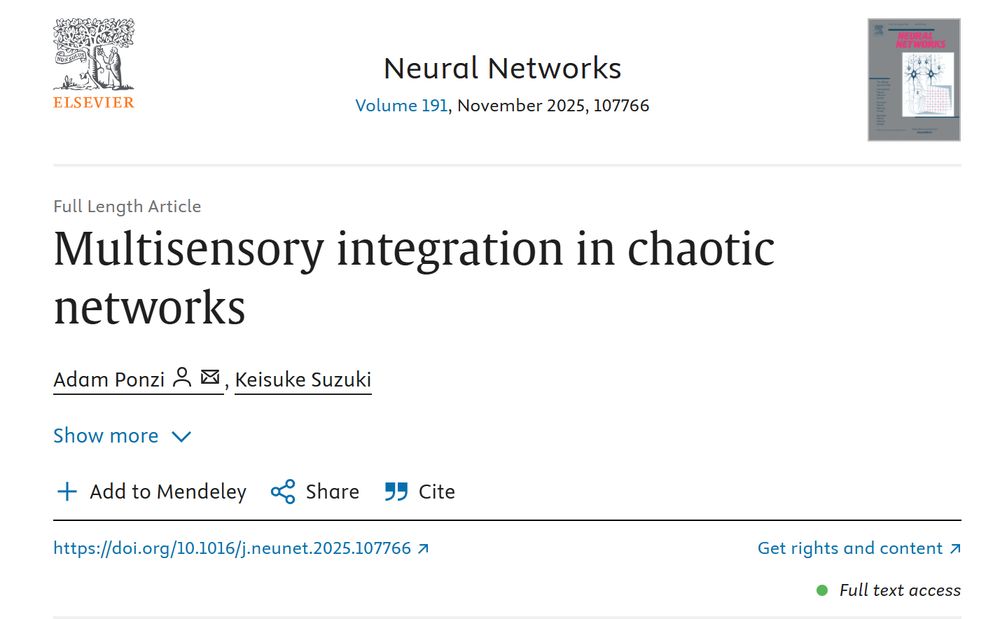
Ever wonder why a ventriloquist's dummy seems to talk, or why a rubber hand can feel like your own? 🤔 Our brains perform an amazing trick, merging what we see, hear, and feel into a single reality. But this process isn't always stable.
A new theory on why. 🧵
1/7
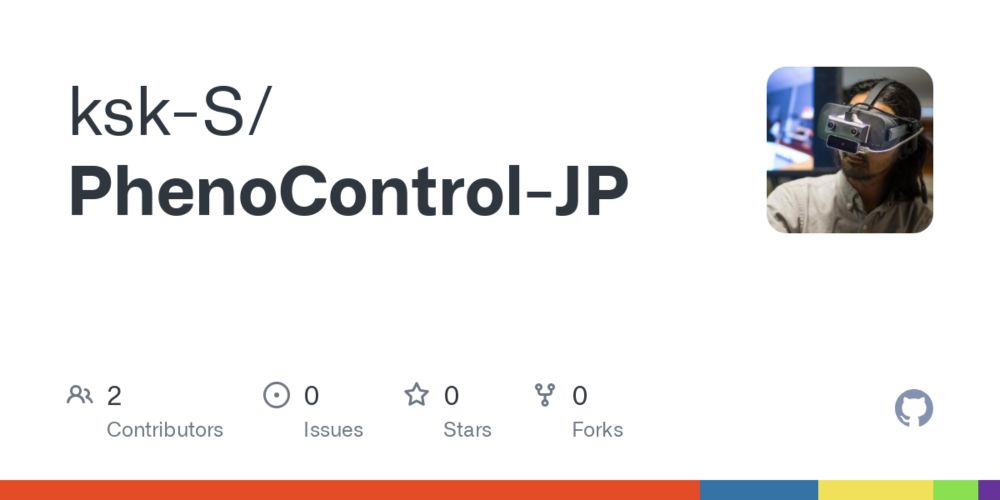
7/7 And there's more! We've also created and released a program to easily administer the PCS-J in online or lab experiments, handling instruction presentation (audio/text) and response recording! 💻 Researchers, please feel free to use it! 🔗 github.com/ksk-S/PhenoC... #OpenScience
30.05.2025 12:49 — 👍 1 🔁 0 💬 0 📌 06/7 These findings suggest that the PCS-J indeed correlates with related psychological traits (positive schizotypy – indicating convergent validity) and does not correlate with less related traits (negative schizotypy – indicating discriminant validity), supporting the scale's validity.
30.05.2025 12:49 — 👍 1 🔁 0 💬 1 📌 05/7 We also examined the construct validity of the PCS-J (i.e., does it accurately measure what it's intended to measure?). Scores correlated with SPQ-B "positive schizotypy" (cognitive-perceptual), but NOT "negative schizotypy" (interpersonal). A new finding not in the original PCS! 🙌
30.05.2025 12:49 — 👍 1 🔁 0 💬 1 📌 04/7 We have now developed the Japanese version of the PCS, the "PCS-J"! ✨ In a pre-registered online study, we confirmed both test-retest reliability (consistency of results over time) and internal consistency (consistency of items within the scale) were good (even higher than original!).
30.05.2025 12:49 — 👍 1 🔁 0 💬 1 📌 03/7 To objectively measure the degree of this "Phenomenological Control," Lush et al. (2021) developed the self-report "Phenomenological Control Scale (PCS)." This scale was specifically designed to measure an individual's PC ability without using the term "hypnosis". doi.org/10.1525/coll...
30.05.2025 12:49 — 👍 1 🔁 0 💬 1 📌 02/7 Crucially, the term "Phenomenological Control" was proposed by Lush et al. to capture this ability more directly and neutrally, avoiding the specific theoretical implications and common misconceptions associated with "hypnosis" (e.g., needing a special trance state).
30.05.2025 12:49 — 👍 1 🔁 0 💬 1 📌 01/7 First, what is "Phenomenological Control" (PC)? 🤔 It's a broad concept referring to the ability to alter subjective sensations or experiences (e.g., hearing a sound that isn't there) in response to suggestions, whether intentional or not. Think experiences in hypnosis or imaginative suggestion.
30.05.2025 12:49 — 👍 2 🔁 0 💬 1 📌 0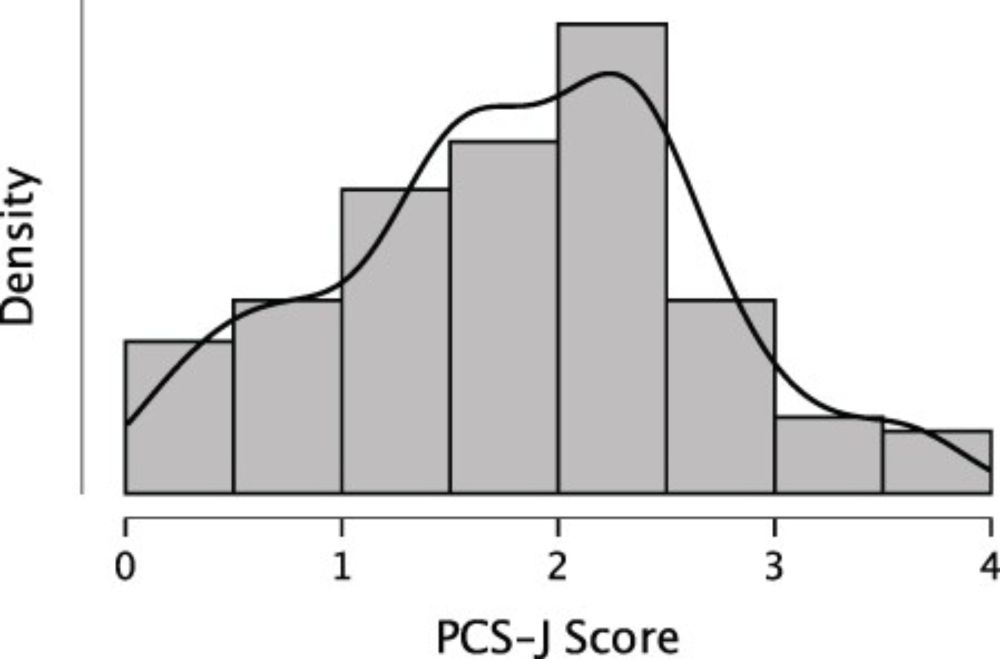
Imaizumi, S., & Suzuki, K. (2025). DOI: doi.org/10.1093/nc/n... (Explaining in this thread 👇) #Psychology #PhenomenologicalControl
30.05.2025 12:49 — 👍 2 🔁 0 💬 1 📌 0🎉 Paper Published! 🎉 Our paper, "The Japanese version of the Phenomenological Control Scale," has been published in Neuroscience of Consciousness! If you're interested in individual differences in phenomenological control, please check it out!
30.05.2025 12:49 — 👍 5 🔁 2 💬 1 📌 0
7/7 そして!PCS-Jをオンライン実験や実験室実験で手軽に実施できるよう、教示の提示(音声・テキスト対応)から回答記録までを行えるプログラムも作成し、公開しました!💻 研究者の皆さん、ぜひご活用ください! 🔗 github.com/ksk-S/PhenoC... #認知科学 #オープンサイエンス
30.05.2025 12:40 — 👍 0 🔁 0 💬 0 📌 06/7 この結果は、PCS-Jが関連する心理的特徴(陽性因子)とは確かに相関し(収束的妥当性)、関連の薄い特徴(陰性因子)とは相関しない(弁別的妥当性)ことを示唆しており、尺度の妥当性を支持するものです。
30.05.2025 12:40 — 👍 0 🔁 0 💬 1 📌 05/7 さらに、PCS-Jが測定したい概念をきちんと捉えているか(構成概念妥当性)も検討しました。 その結果、PCS-Jの得点は、統合失調型パーソナリティ傾向(SPQ-B)の「陽性因子(認知・知覚)」と関連し、「陰性因子(対人関係)」とは関連しないことが明らかに。これはオリジナル版では未検証の、私たちの新たな知見です!🙌
30.05.2025 12:40 — 👍 0 🔁 0 💬 1 📌 04/7 今回、私たちはこのPCSの日本語版「PCS-J」を開発しました!✨ 事前登録したオンライン調査で信頼性を検証した結果、テストと再テストでの結果の一致度(再検査信頼性)も、質問項目の一貫性(内的整合性)も良好でした。特に内的整合性はオリジナル版よりも高い値を示しています。
30.05.2025 12:40 — 👍 0 🔁 0 💬 1 📌 03/7 「現象学的制御」はいわゆる「催眠」や「暗示」で見られるような体験の変化を広く含みますが、提唱者Lushらは、「催眠」という言葉がまとう特定の理論や誤解を避け、体験そのものへ中立的に注目するために「現象学的制御」と名付けました。より詳しくは原著論文(Lush et al., 2021)を!
30.05.2025 12:40 — 👍 0 🔁 0 💬 1 📌 02/7 この「現象学的制御」の度合いを客観的に測るため、Lushらが自己記入式の「Phenomenological Control Scale(PCS)」を開発しました (Lush et al., 2021)。 参加者は「腕が軽くなるのを感じてください」といった様々な指示を聞き、その間の体験を数値で評価します。 原著論文(PCS開発):https://doi.org/10.1525/collabra.29542
30.05.2025 12:40 — 👍 0 🔁 0 💬 1 📌 01/7 まず「現象学的制御」とは?🤔 これは、暗示などに応じ、主観的な体験(例:実際にはない音を聞く、体が自分の意志とは無関係に動くように感じる)を変化させる能力のことで、この力には個人差があります。
30.05.2025 12:40 — 👍 0 🔁 0 💬 1 📌 0
御茶ノ水女子大学の今泉修さん との論文「現象学的制御尺度(Phenomenological Control Scale)の日本語版開発」がNeuroscience of Consciousness誌に掲載されました! 現象学的制御の個人差にご興味のある方はぜひご覧ください! DOI: doi.org/10.1093/nc/n... (スレッドで解説します👇) #心理学 #現象学的制御
30.05.2025 12:40 — 👍 4 🔁 1 💬 1 📌 0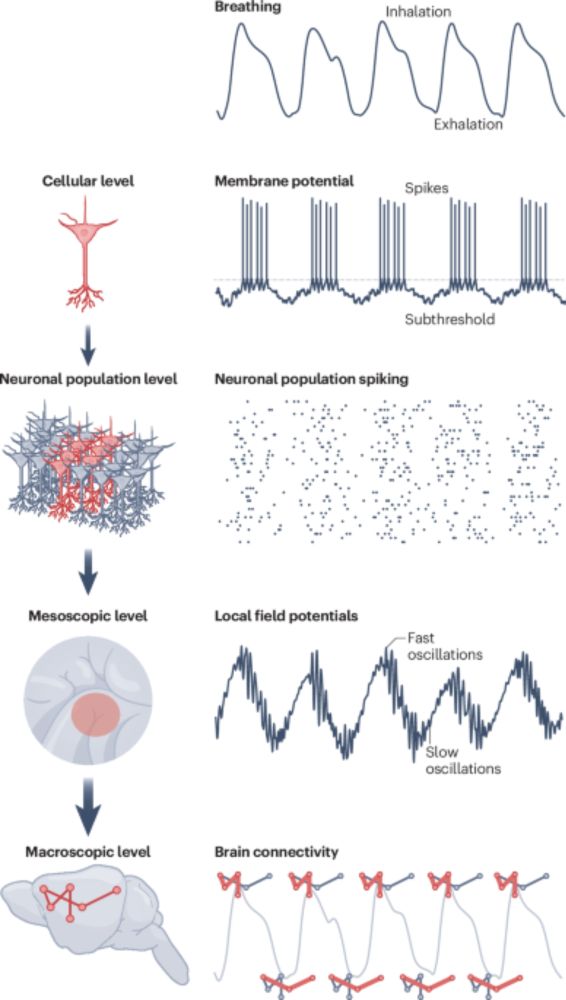
Global coordination of brain activity by the breathing cycle
www.nature.com/articles/s41...
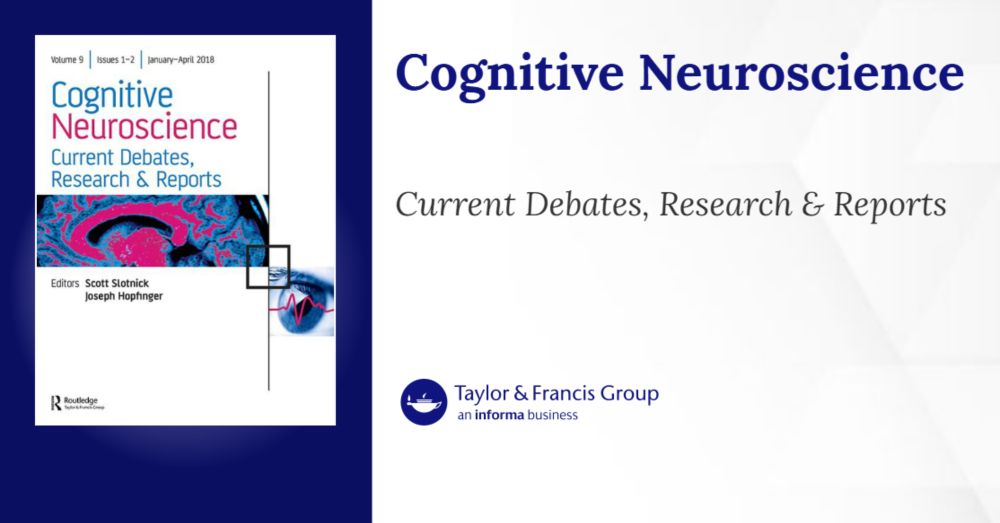
Beyond Markov: Transformers, memory, and attention
www.tandfonline.com/doi/full/10....

Emergence of Goal-Directed Behaviors via Active Inference with Self-Prior arxiv.org/abs/2504.11075
20.04.2025 04:59 — 👍 3 🔁 2 💬 0 📌 0